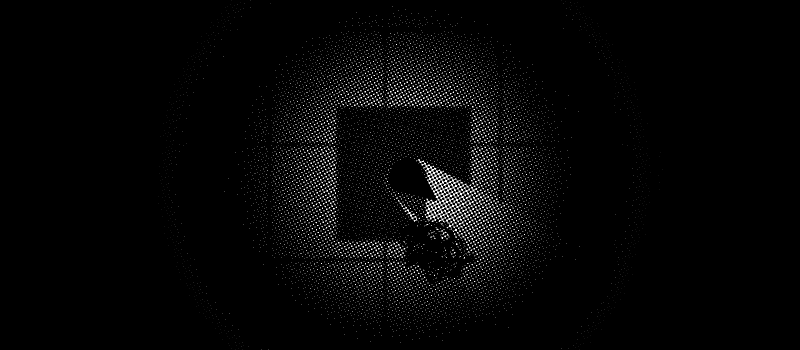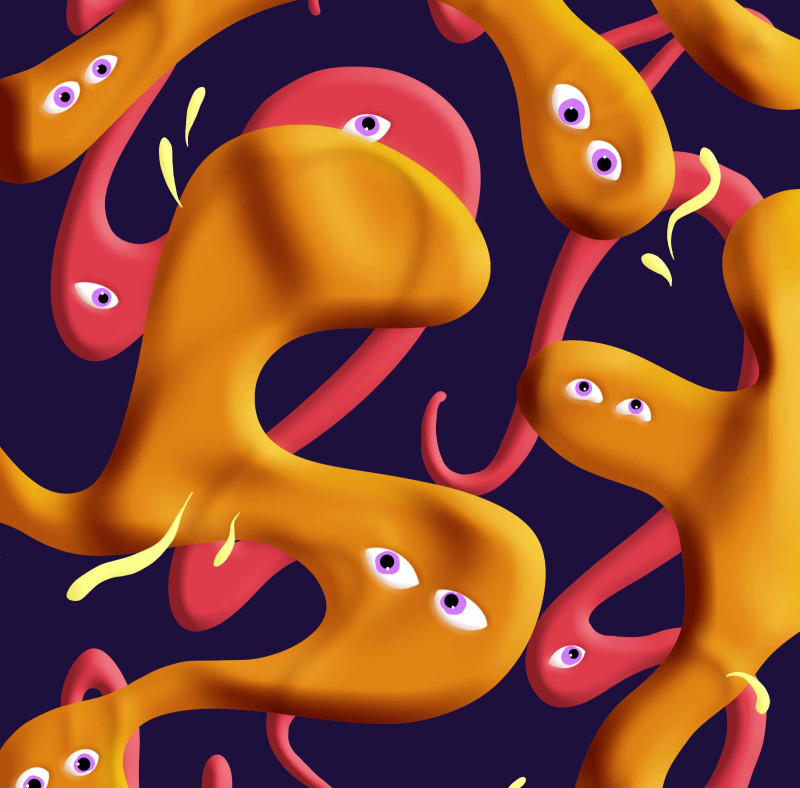Compass
“Fear is not the enemy. It’s just a compass that points to the areas where we need to grow.” That quote by American personal development blogger Steve Pavlina greets you at the end of Compass, a short game about the long-term process of overcoming fear.
Created for Ludum Dare 34 game jam, the goal was to create either a game controlled with two buttons, or one themed around growth. Linsey Raymaekers decided to tackle both. In Compass, you navigate a grid using the left and right arrow buttons. Your compass points you in the direction you need to go - headfirst into the fear.
The message is clear: confronting your fears is the only way to overcome them in the long run. The twisted audio that plays when you do this, doesn’t make it a very fun experience, and chances are even though you know where you need to go, you’ll tiptoe around it a bit before mustering up the courage to tackle a bigger one. And a bigger one. And a bigger one.
About the developer
Linsey Raymaekers is a Belgian programmer that currently lives and works in Berlin. She’s given various talks on using video games for self expression and believes technology exists to serve artistic goals. She loves Houdini.

Interview with Linsey Raymaekers
You created Compass for Ludum Dare 34. The theme for the game jam was either a game about growth or a game that was controlled with two buttons. You decided to do both, but why create a game about fear?
I don’t recall if I really wanted to make a game about fear. At the time I was really interested in personal games and using your personal experiences in video games, so I was thinking a lot about these things. At the end of the game there’s this quote (“Fear is not your enemy. It is a compass pointing you to the areas where you need to grow.”) that had a really big impact on me. I’ve lived by it for many years. Fear was a big topic for me throughout my teenage years and early twenties. Maybe it still is, I’m not sure.
When I thought about what could work with two buttons, somehow a compass made sense to me. Then I remembered that quote and that’s how I got the idea to make this game.
Fear is a very broad and abstract concept. Were there specific fears you were struggling with back then?
I was a very shy teenager. In school, I had a huge fear of simply leaving my hair down. I always had it in a ponytail and the first time I wanted to let it down I was so nervous. I had similar feelings towards wearing fingerless gloves. For some reason I was really afraid to wear those to school. But in the end you know you’ve got to do these things sooner or later.
How do you know that?
I don’t know, sometimes you just feel like something’s good for you. You want to do it, but you also know “oh darn, this is really terrifying”, but you still do it because you feel that’s the way you have to go.
To win the game you have to confront your fears. Do you feel the best thing to do with your fears is confront them?
It depends on the fears of course. If you’re afraid of tigers I wouldn’t recommend going one-on-one with them. But if there’s something you really want to do, but are afraid of doing, I think it’s best to confront that fear sooner or later.
Next there’s the visual representation of fear: did you have to think long about how to go about that?
I couldn’t really think a lot about it because we only had 48 hours to complete the game. As a result of the two button restriction, I felt like your compass always needed to be on the move. Just like in life, you can’t stand still. I tried to create a feeling of fear with the sound that comes on when you look at it, and then when you’re in it, you feel really uncomfortable and your body starts shaking. I think it was mostly subconscious, I literally scribbled the visuals in Photoshop.
In the end the fears become little blobs, but before that they always become bigger and bigger, more frightening. Do you want to say it first has to become worse in order for it to get better?
The idea is more like this: how do you start confronting fear if you live in fear? You start out small and you incrementally go bigger, you do something that scares you even more. Once you’ve done this amazing thing, overcome this huge fear, you realize that a lot of your other, smaller fears don’t impact you as much anymore. Again, I do believe this happened subconsciously, but there’s certainly something there.
You mentioned that you were at the time interested in personal games. Has that changed or do you have less time to focus on these things?
It’s moved a little into the background, but I’m actually getting into it again. After I finished my master’s degree I was doing a lot of public speaking on the topic but I stopped doing that when I started working full time. I focused on other aspects for a while but I’m rediscovering it. Now that I’ve learned to do 3D as well, before everything I did was in 2D, I’m exploring how these things could work in 3D.
You have a background in programming. Without stereotyping, when it comes to alt-games I feel there’s always been this contrast between coders or engineers and artists or designers, the latter group being more associated with it. Do you feel there’s a division there?
I started to realise I’m more of a technical art person. Before I learned programming or was making video games, I was doodling in Photoshop. Back in the day people on forums had avatars and signatures and I would make pretty images for those. So I was doing art before I started programming. I see programming and engineering as a means to an end, to create the things that I want, which are more artistic in nature.
That’s one of the reasons I think Houdini is a really awesome tool. It’s very technical, which my programmer brain loves, but at the same time you get immediate visual feedback. There’s a lot of sliders to use, which is great when you’re trying to make something artistically expressive.
What would you like people to take away from playing your game at the exhibition?
I think the quote explains it all. At some point I wondered if I should include it like that, but I thought the game could use that context. Not specifically related to this project, I hope that people realize that video games can be a very expressive medium.
Interview by Christophe De Bont
For more info, follow @DifferentPerspectives_Festival on Instagram
